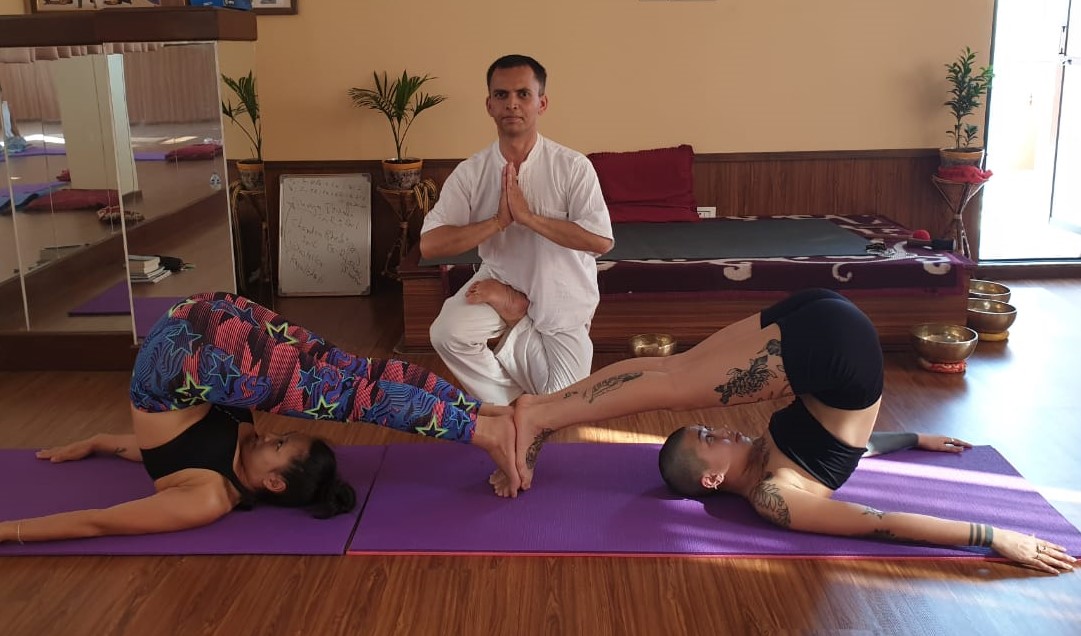THE FIVE PRINCIPLES OF YOGA
22 Feb 2020 HYN Himalayan Yoga Academy

THE FIVE PRINCIPLES OF YOGA
Yoga is a complete science of self-discipline. Yoga balances, harmonises, purifies and strengthens the body, mind and soul of the practitioner. It shows the way to perfect health, perfect mind control, perfect peace with one’s Self, the world, nature and God. Millions of people have begun to practice yoga through the application of the simple time-tested techniques. We discuss FIVE PRINCIPLES OF YOGA here below.
Positive, focused thoughts are much more powerful than negative, confused thoughts. No external technology can control surging emotions and imaginations. No type of alcohol, drugs (whether tranquillisers, sleeping pills, or wake-up pills), or other such instruments can hope to offer a long-term solution to epidemic mental weakness.
These chemicals destroy not only the bodies and minds of the users but also those of their offspring creating genetic disturbances and unbalancing the mental vibration. Real peace comes only to those who can control the body and mind with proper self-discipline.
Here are the 5 principles of Yoga that you should follow or keep in mind :
1. Proper Exercise :
Proper exercise acts as a lubrication system to the joints, muscles, ligaments, tendons, and so forth, by increasing circulation and flexibility. Yogic exercise can be compared to no other system in its complete overhauling of the entire being. A yoga asana, posture, is meant to be held for some time. Performed slowly and consciously, the asanas not only produce physical benefits, but are mental exercises in concentration and meditation. Yoga exercise focuses first on the health of the spine. The spinal column houses the centre of the nervous system, the telegraphic system of the body. As a direct extension of the brain, the healthy spine aids in the health of the whole body. Maintaining the spine’s flexibility and strength through proper exercise, circulation is increased, the nerves are ensured their supply of nutrients and oxygen and the body retains its youthful state.
Asanas affect the deeper and more subtle parts of the body. The internal organs receive massage and stimulation through the various movements and are toned into functioning more efficiently. As yoga postures are always practised with deep breathing, relaxation and concentration, the asanas also help to develop mental control.
2. Proper Breathing :
Proper breathing connects the body to its battery, the solar plexus, where tremendous potential energy is stored. When tapped through specific yoga breathing exercises (pranayama), this energy is released for physical and mental rejuvenation. Most people use only fraction of their lung capacity for breathing. They breathe in a shallow fashion using only a small part of the rib cage. Their shoulders are hunched, they have painful tension in the upper part of the back and neck and they suffer from lack of oxygen. They become tired easily and don’t know why.
Tension and even depression may be overcome by proper diaphragmatic breathing. All the diseases of the body can be destroyed at the root by regulating the prana, vital energy; this is the secret knowledge of healing. Acupuncturists, shiatsu, faith healing, doctors with healing touch and so forth, are examples of the development of a high degree of conscious or unconscious control of prana. In ordinary breathing we extract very little prana, but when we concentrate and consciously regulate our breathing, we are able to store a greater amount in our nerve centres and brain. So Proper Breathing is also one the 5 principles of yoga
3. Proper Relaxation :
Proper relaxation cools down the system. Relaxation is Nature’s way of recharging the body. When the body and mind are continually overworked their efficiency diminishes. To regulate and balance the work of the body and the mind it is necessary to economise the energy produced by our body—the main purpose of learning how to relax. Even while resting the average person spends so much energy through needless physical and mental tension. In the course of one day our body usually produces all the substances and energy necessary for the next. But often all these are consumed within a few minutes by bad moods, anger, injury or irritation. So Proper relaxation is one of the FIVE PRINCIPLES OF YOGA.
4. Proper Diet :
Proper diet provides fuel for the body. The yogic diet is a vegetarian one, consisting of pure, simple, natural foods that are easily digested and assimilated and that promote health. One should have a certain knowledge of dietetics in order to balance the diet. The yogic attitude toward diet is to eat to live, not live to eat. The yogi will consume foods in minimum quantity with the most positive effect on the body and mind and with the least negative impact on the environment and least pain to other beings. One of the first ways to take responsibility for the planet is by eating with consideration. So proper diet is also one of the FIVE PRINCIPLES OF YOGA
5. Positive thinking & meditation
Positive thinking & meditation put you in control. The intellect is purified. The lower nature is brought under conscious control through steadiness and concentration of the mind.
